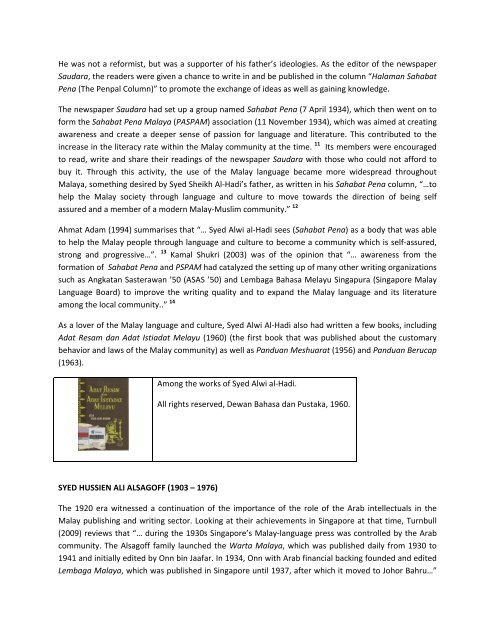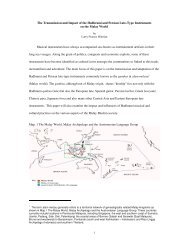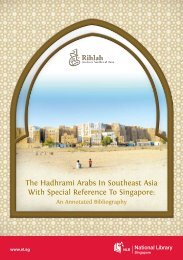CONTRIBUTIONS OF PERANAKAN ARAB ... - Rihlah
CONTRIBUTIONS OF PERANAKAN ARAB ... - Rihlah
CONTRIBUTIONS OF PERANAKAN ARAB ... - Rihlah
Create successful ePaper yourself
Turn your PDF publications into a flip-book with our unique Google optimized e-Paper software.
He was not a reformist, but was a supporter of his father’s ideologies. As the editor of the newspaper<br />
Saudara, the readers were given a chance to write in and be published in the column “Halaman Sahabat<br />
Pena (The Penpal Column)” to promote the exchange of ideas as well as gaining knowledge.<br />
The newspaper Saudara had set up a group named Sahabat Pena (7 April 1934), which then went on to<br />
form the Sahabat Pena Malaya (PASPAM) association (11 November 1934), which was aimed at creating<br />
awareness and create a deeper sense of passion for language and literature. This contributed to the<br />
increase in the literacy rate within the Malay community at the time. 11 Its members were encouraged<br />
to read, write and share their readings of the newspaper Saudara with those who could not afford to<br />
buy it. Through this activity, the use of the Malay language became more widespread throughout<br />
Malaya, something desired by Syed Sheikh Al‐Hadi’s father, as written in his Sahabat Pena column, “…to<br />
help the Malay society through language and culture to move towards the direction of being self<br />
assured and a member of a modern Malay‐Muslim community.” 12<br />
Ahmat Adam (1994) summarises that “… Syed Alwi al‐Hadi sees (Sahabat Pena) as a body that was able<br />
to help the Malay people through language and culture to become a community which is self‐assured,<br />
strong and progressive…”. 13 Kamal Shukri (2003) was of the opinion that “… awareness from the<br />
formation of Sahabat Pena and PSPAM had catalyzed the setting up of many other writing organizations<br />
such as Angkatan Sasterawan ’50 (ASAS ’50) and Lembaga Bahasa Melayu Singapura (Singapore Malay<br />
Language Board) to improve the writing quality and to expand the Malay language and its literature<br />
among the local community..” 14<br />
As a lover of the Malay language and culture, Syed Alwi Al‐Hadi also had written a few books, including<br />
Adat Resam dan Adat Istiadat Melayu (1960) (the first book that was published about the customary<br />
behavior and laws of the Malay community) as well as Panduan Meshuarat (1956) and Panduan Berucap<br />
(1963).<br />
SYED HUSSIEN ALI ALSAG<strong>OF</strong>F (1903 – 1976)<br />
Among the works of Syed Alwi al‐Hadi.<br />
All rights reserved, Dewan Bahasa dan Pustaka, 1960.<br />
The 1920 era witnessed a continuation of the importance of the role of the Arab intellectuals in the<br />
Malay publishing and writing sector. Looking at their achievements in Singapore at that time, Turnbull<br />
(2009) reviews that “… during the 1930s Singapore’s Malay‐language press was controlled by the Arab<br />
community. The Alsagoff family launched the Warta Malaya, which was published daily from 1930 to<br />
1941 and initially edited by Onn bin Jaafar. In 1934, Onn with Arab financial backing founded and edited<br />
Lembaga Malaya, which was published in Singapore until 1937, after which it moved to Johor Bahru…”




